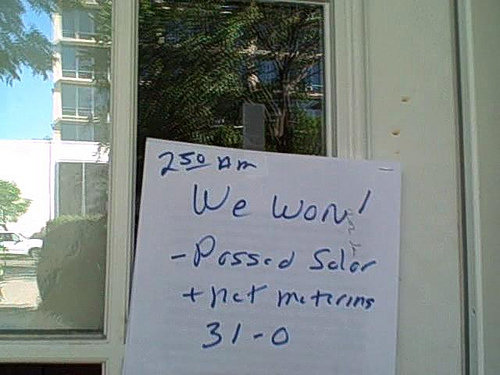 Last night at 11:58 pm (wink, wink), just as we suspected would happen, the Texas Senate unanimously passed through the net metering bill, HB 1243, with solar SB 545 amended on as a bonus. This is great news for Texas consumers, the environment, and solar power.
Last night at 11:58 pm (wink, wink), just as we suspected would happen, the Texas Senate unanimously passed through the net metering bill, HB 1243, with solar SB 545 amended on as a bonus. This is great news for Texas consumers, the environment, and solar power.
As you may recall, HB 1243 will ensure that owners of solar installations, small wind turbines, or biogas generators get paid a fair price for the excess power they produce. SB 545 — which after the Voter ID slowdown, we thought was dead — increases incentives for distributed solar power generation by creating a pool of $500 million in solar rebates over the next 5 years. It also calls for a pilot program with a minimum funding of $4 million to put solar on schools (nudge: the State Energy Conservation Office could potentially spend considerably more of their pending stimulus funds to further these projects) and will create thousands of green, local jobs across the state of Texas.
Another amendment to the bill added on SB 2349. This provision would allow oil wells that create natural gas, but not enough to justify paying for collection, to build a generator to run the gas through, make electricity, and sell it back into the grid. The bill would limit production to 2 MW so that they can provide distributed generation. As of right now, they’re just flaring that gas off, so this is definitely a good thing.
According to our friends at Environment Texas (via the Houston Chronicle’s NewsWatch: Energy blog), the amended HB 1243 also
• Requires home builders to offer solar as a standard option in developments with 50 homes or more.
• Prevents homeowners associations from blocking solar panel installations
• Allows up to 70% of incentive funds to be used for utility-scale solar projects
• Allows the Public Utility Commission to extend the program for an additional five years and another $500 million if it determined that a “substantial” amount of manufacturing of solar generation products located in Texas after the initial five-year program
• Requires electric co-ops to allow consumers to interconnect solar to the grid
• Clarifies that consumers will not have to register as a utility and that third party ownership of solar is allowed
• For the next two years, requires retail electric providers to pay at least five cents per kilowatt hour for surplus solar and four cents for other renewable technologies and directs the PUC to determine a fair market price that will become a new “floor” following the two years
• Creates a “Made in Texas” program to certify and encourage Texans to buy locally manufactured solar panels and other energy products. As a result, locally produced products qualify for a 20% larger rebate than imports.
Now that HB 1243 has successfully passed through both chambers of the legislature, we’ve just got to wait and see what comes out of conference committee, where bill authors from both sides will smooth out the differences between their bills. Many thanks to all of you that wrote e-mails and made phone calls in support of these bills. This is a tremendous victory for Texas solar. Keep your fingers crossed that we can send this bill to Governor Perry’s desk!


